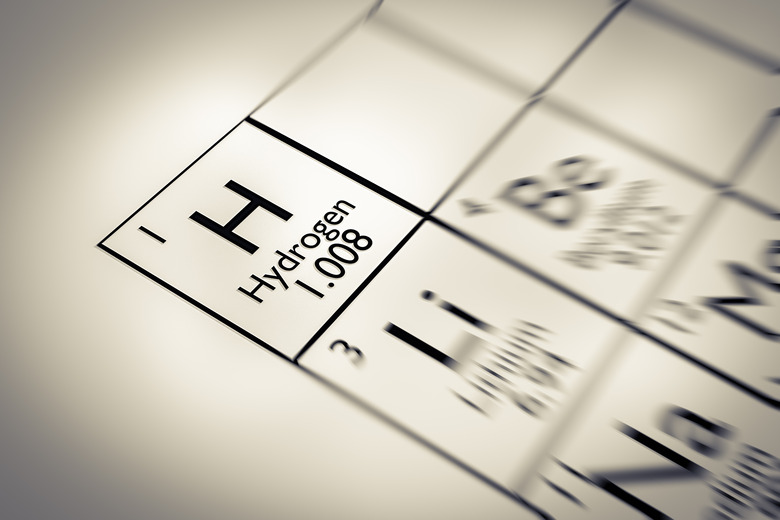What Is The Mass Percent Of Hydrogen In Water?
In chemistry, finding the mass percentage of an element in a compound might sound complicated, but the calculation is simple. For example, to determine the mass percentage of hydrogen in water (H2O), divide the molar mass of hydrogen by the total molar mass of water and then multiply the result by 100. All the information you need is on the periodic table.
TL;DR (Too Long; Didn't Read)
The mass percentage of hydrogen in water is 11.19 percent.
Molar Mass of Elements
Molar Mass of Elements
For any compound, you determine the total molar mass by adding up the molar masses of each element. When you look up an element in the periodic table, the number on top is the atomic number, and the one beneath the element symbol is the average atomic mass, given in atomic mass units (amu). For any atoms that appear more than once in the molecule, multiply the molar mass by the element's quantity in the chemical formula. For example, there are two hydrogen atoms in the water molecule, so multiply hydrogen's atomic mass by 2.
Molar Mass of Water
Molar Mass of Water
The atomic mass of hydrogen taken from the periodic table is 1.008. Because the molecule has two hydrogen atoms, multiply 1.008 by 2 to get 2.016. The atomic mass of oxygen is 16.00, and the molecule has only one oxygen atom, so oxygen's total mass remains 16.00. Add 2.016 to 16.00 to get 18.016. This is the total molar mass of water.
Mass Percent of Hydrogen
Mass Percent of Hydrogen
To find the mass percent of hydrogen in water, take the molar mass of hydrogen in the water molecule, divide by the total molar mass of water, and multiply by 100. Dividing 2.016 by 18.016 gives you 0.1119. Multiply 0.1119 by 100 to get the answer: 11.19 percent.
Mass Percent of Oxygen
Mass Percent of Oxygen
You can use two methods to find the mass percent of oxygen in water. From the calculation above, you know the percentage of hydrogen is 11.19 percent, and water has only hydrogen and oxygen, so the two added together must equal 100 percent. Subtract 11.19 from 100 to get 88.81 percent. The second method is the same as for finding the mass percent of hydrogen. From previous calculations, you know the total molar mass of oxygen in water is 16.00. Divide 16.00 by the total molar mass of water, 18.016, to get 0.8881. Multiply by 0.8881 by 100 to get the percentage: 88.81 percent.
Ratios of Mass
Ratios of Mass
As the water molecule has exactly two elements, you can use the numbers already calculated to determine the ratios of mass. For example, to find the ratio of mass of hydrogen to oxygen in water, divide the total molar mass of hydrogen, 2.016, by the molar mass of oxygen, 16.00 and get 0.126. To find the ratio of oxygen to hydrogen, divide 16.00 by 2.016 and get 7.937. This means in water, oxygen outweighs hydrogen by almost 8 to 1.
Cite This Article
MLA
Papiewski, John. "What Is The Mass Percent Of Hydrogen In Water?" sciencing.com, https://www.sciencing.com/what-is-the-mass-percent-of-hydrogen-in-water-13710464/. 27 March 2018.
APA
Papiewski, John. (2018, March 27). What Is The Mass Percent Of Hydrogen In Water?. sciencing.com. Retrieved from https://www.sciencing.com/what-is-the-mass-percent-of-hydrogen-in-water-13710464/
Chicago
Papiewski, John. What Is The Mass Percent Of Hydrogen In Water? last modified March 24, 2022. https://www.sciencing.com/what-is-the-mass-percent-of-hydrogen-in-water-13710464/
